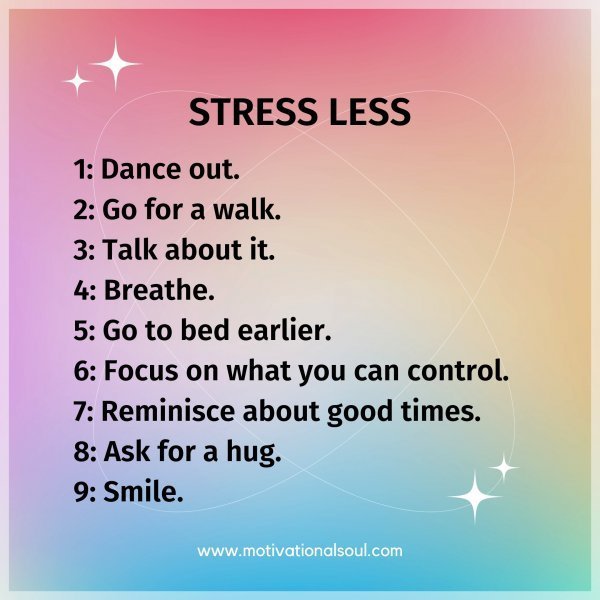Stress-Busting Tips to Help You Handle Any Difficult Situation

We all know that feeling – the one where we’re so stressed out that we can’t think straight. We feel overwhelmed and like we’re about to burst. This is not a good place to be in, both mentally and physically. Stress can cause all sorts of health problems, including heart disease, high blood pressure, and even cancer. In this blog post, we will discuss stress-busting tips that will help you handle any difficult situation!
Determine the Cause of Your Stress
One of the most important steps in managing stress is identifying its source. What is causing you to feel so stressed out? Is it your job, your family life, or something else entirely? Once you know what is causing your stress, you can begin to work on finding a way to cope with it. For some people, the source of their stress is obvious.
If you’re constantly worrying about money or your job security, then it’s clear that these are major sources of stress in your life. Other people’s stress may be more subtle. If you find yourself feeling stressed and anxious but you can’t pinpoint the cause, it might be helpful to keep a journal. Write down what you did each day and how you felt afterward. After a week or two, you might start to see patterns emerge. Once you know what is causing your stress, you can begin to work on finding a way to cope with it.
Learn How to Keep a Stress Journal
For many people, stress is a daily constant. Chronic stress can lead to a variety of health problems, including high blood pressure, anxiety, and depression. It can also make it difficult to focus or sleep properly. One way to help manage stress is to keep a stress journal. Writing down your thoughts and feelings can help to identify patterns and triggers for stress. It can also be a helpful way to release pent-up emotions.
When you’re feeling stressed, take a few minutes to write in your journal. Include what happened, how you felt, and what you did in response. Eventually, you will begin to see resemblances.
Below are some situations which may trigger anxiety, stress, or a feeling of being overwhelmed. Consider how you would feel in each situation:
- What can I do to avoid or change this situation?
- What are my options?
- What is the worst that could happen?
- How likely is it that the worst-case scenario will actually happen?
- What are the potential consequences of this scenario?
- What is the best case scenario?
Some people find it helpful to make a list of possible solutions and then choose the one that seems the best fit.
Have the Appropriate Attitude
One of the best stress-busting tips is to have the right attitude. Of course, it’s easier said than done to remain calm when you’re facing a deadline at work or dealing with a difficult situation at home. However, it’s important to remember that your attitude is a choice. You have the option to concentrate on the bad or good aspects of your life.
If you find yourself getting overwhelmed by stress, take a step back and try to see the situation from a different perspective. Instead of dwelling on what’s going wrong, focus on what you can do to fix the problem. By changing your attitude, you’ll be better equipped to handle stress in a healthy way.
Recognize the Importance of Attitude
A positive attitude is one of the most important things you can bring to any situation, especially when it comes to dealing with stress. It may not seem like much, but your outlook on life can have a surprisingly powerful impact on your stress levels.
Studies have shown that people who maintain a positive outlook are better able to cope with stress, both in the short-term and the long-term. So next time you’re feeling overwhelmed, take a step back and try to see the situation in a more positive light. It may not make the stress go away completely, but it can help you to feel more capable of dealing with it. And that’s an essential part of maintaining your mental health and well-being.
Examine Your Thinking Processes
There’s no doubt about it, stress can be debilitating. It can impact our physical health, our mental well-being, and our overall quality of life. But the good news is that there are things we can do to manage stress and avoid being overwhelmed by it. One of the most effective stress-busting techniques is to examine our thinking processes.
All too often, we allow our thoughts to run away with us, making us feel anxious and stressed. We ruminate on past events or worry about things that haven’t even happened yet. This only serves to make us feel more stressed and doesn’t do anything to help solve the problem at hand.
Instead, try to focus on the present moment and what you can do right now to address the situation. Don’t get bogged down in negative thoughts or “what if” scenarios. And most importantly, don’t be too hard on yourself. Be mindful of your thoughts and try to catch yourself when you’re starting to spiral down the rabbit hole of anxiety and stress. By taking a step back and examining your thinking processes, you can help bust stress before it takes over your life.
Positive Self-Talk
One of the most effective ways to cope with stress is to practice positive self-talk. When we’re feeling overwhelmed, it’s easy to fall into a negative mindset and focus on all the things that are going wrong. However, research has shown that positive self-talk can help to reduce stress and increase resilience. Instead of dwelling on your problems, try to focus on your strengths and achievements.
Remind yourself that you have coped with difficult situations in the past and that you have the ability to overcome this challenge. Positive self-talk can help to reframe your thinking, boost your confidence, and give you the motivation you need to face stressful situations.
Make a Change In your Life
We all experience stress from time to time, and it can take a toll on our physical and mental health. If you’re looking for a way to reduce stress, one thing you can do is make a change in your life. It doesn’t have to be a big change, but even small steps can make a big difference. Maybe you’ve been wanting to start exercising but haven’t had the time. Or maybe you’ve been meaning to eat healthier but find it hard to stick to a diet.
Whatever the change may be, making it will help you to feel more in control of your life and less stressed. So if you’re ready to ditch the anxiety and live a happier, healthier life, start by making a change today.
Solutions-Focused Coping
For years, scientists have been studying the link between stress and health. They’ve found that chronic stress can take a toll on your body, increasing your risk for a host of ills, from heart disease and depression to sleep problems and memory decline. But it’s not all bad news. Research also shows that there are steps you can take to counter the effects of stress. One particularly effective strategy is known as solution-focused coping.
When you’re feeling stressed, it’s easy to get caught up in all the things that are going wrong. Solution-focused coping helps you take a different tack. Instead of dwelling on the problem, you focus on finding a solution. Not only does this help you feel better in the moment, but it also empowers you to take control of the situation and make positive changes.
Here are some examples of how to deal with stress in a solution-focused manner:
- Identifying your goals and taking steps to achieve them
- Making a plan of action
- Setting realistic expectations
- Breaking down big tasks into smaller, more manageable pieces
- Source of emotional support.
Get Rid Of The Things You’re Putting Up With
You wake up feeling groggy, shower in a rush, gulp down some coffee, and head to a job you’re not particularly thrilled about. Or maybe you’re dealing with a toxic friend or family member. Whatever the case may be, we’ve all found ourselves in situations that cause stress. And while it might seem impossible to eliminate all the sources of stress in our lives, there are some things we can do to make things easier.
One stress-busting tip is to get rid of the things you’re putting up with. If your job is making you miserable, start looking for a new one. If you have a friend who is always bringing you down, consider distancing yourself or ending the friendship altogether. Sometimes, getting rid of stressful situations is the best solution. But if that’s not possible, try to adopt a more positive outlook or establish better coping mechanisms. With a little effort, you can start reducing the amount of stress in your life.
Make a New Life Plan
Everybody knows that stress can be harmful to our physical and mental well-being. If you’re feeling overwhelmed, it may be time to take a step back and reassess your priorities. One of the best ways to do this is to create a New Life Plan.
This involves taking a close look at your current situation and setting some goals for what you want to achieve in the future. Once you have a plan in place, you’ll be able to take action steps towards reaching your goals. This can help reduce stress by giving you a sense of control over your life. Additionally, setting realistic goals will help you avoid putting unnecessary pressure on yourself. So, if you’re looking for ways to bust stress, try creating a New Life Plan today.
Build Resilience
Resilience is the capacity to bounce back after adversity. It’s a key ingredient in stress management because it helps you cope with difficult situations and emerge unscathed. People who are resilient have a few things in common. They’re able to keep things in perspective, maintain a positive outlook, and draw on their inner strength when times get tough. They also have a good support system in place and know how to take care of themselves. If you want to build resilience try this out:
Self Care
Every day we are bombarded with demands and deadlines. It is no wonder that so many of us feel stressed out and overwhelmed. The good news is that there are some simple things you can do to help reduce stress and build resilience. One of the best ways to manage stress is to take care of yourself. To stay healthy and function at your best, make sure to get enough sleep, exercise regularly, and eat a nutritious diet.It is also important to take time for your hobbies and interests.
Doing things you enjoy can help reduce stress and increase your sense of well-being. If you find yourself struggling to cope with stress, it may be helpful to talk to a therapist or counselor. They can provide support and guidance on how to manage your stress in a healthy way. By taking care of yourself and building resilience, you can help reduce the amount of stress in your life.

Exercise
Exercise is a great way to reduce stress. It gets your endorphins going, which can help to improve your mood and give you more energy. It also helps to relieve tension in your muscles, and it can give you a chance to clear your mind and focus on something other than your stresses. Plus, it’s good for your overall health! So if you’re feeling stressed out, go for a run, take a yoga class, or just get outside and move your body. You’ll feel better in no time.
Meditation
For most of us, stress is an unavoidable reality juggling work, family, and social obligations can leave us feeling frazzled and exhausted. However, there are some simple things we can do to help reduce our stress levels. One of the most effective is meditation.
Meditation helps to clear our minds and focus our thoughts, making it easier to cope with stressful situations. It can also help to improve our sleep quality and increase our energy levels. Best of all, it’s free and easy to do anywhere. So next time you’re feeling overwhelmed, try taking a few minutes to sit quietly and meditate. You might just find that it makes all the difference.
Wrapping Up
Stress is a normal part of life, but it does not have to rule your existence.By using these stress-busting tips, you can help reduce your stress levels and improve your overall well-being. So don’t wait – start busting stress today!




Recent Comments